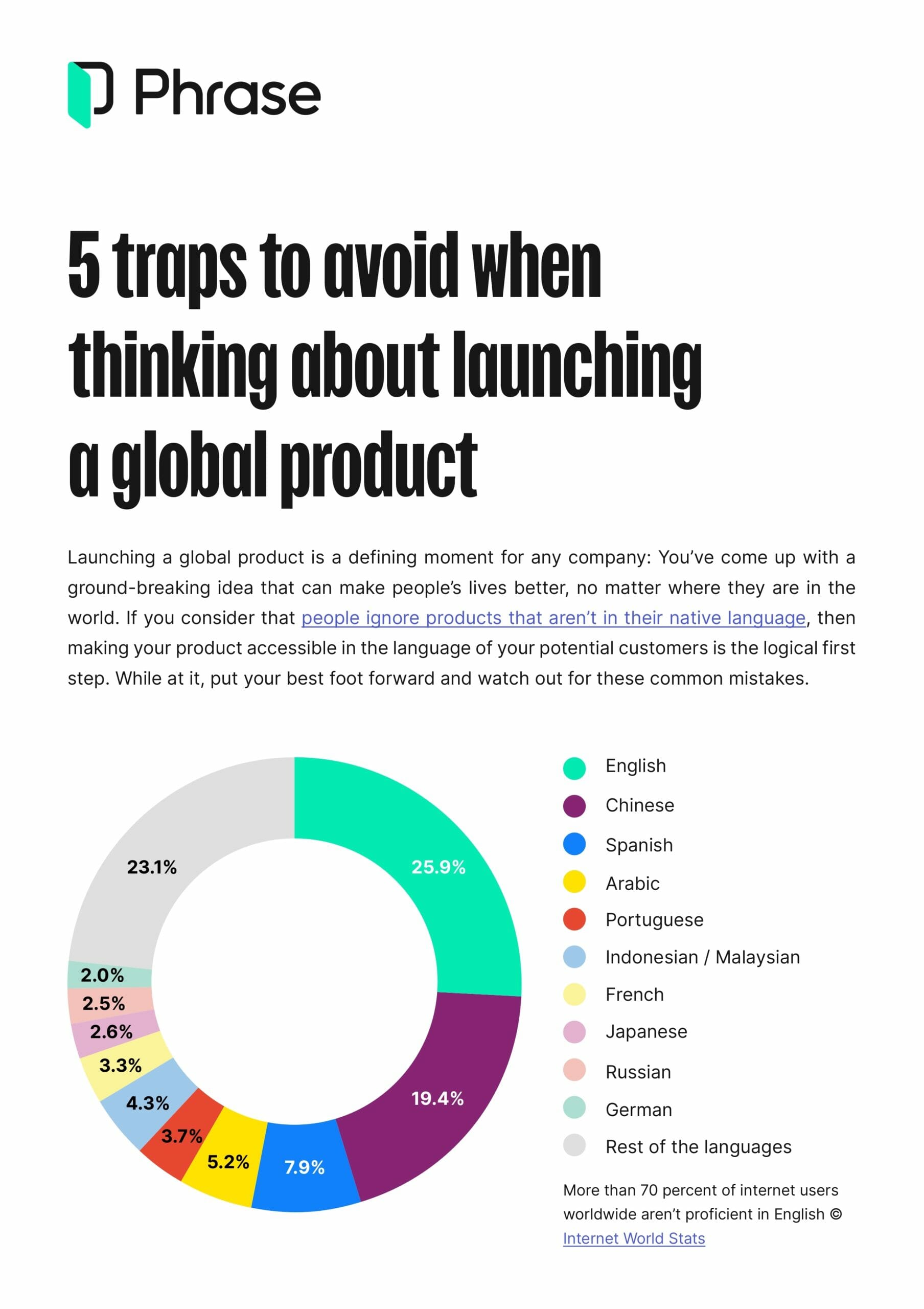Global business
International SEO: Best Practices to Optimize Your Website for Global Reach

With the world more connected than ever, a website is crucial for the success of any business seeking to expand internationally. Still, even the most beautifully designed website can’t guarantee success unless it attracts visitors. To truly thrive in the global market, you need to optimize your website for international SEO.
International SEO is one of the most effective ways to leverage organic search to reach target audiences in different countries. This comprehensive guide explores the concept of international SEO, why it’s important for global business, and how to create an effective strategy for lasting success.
What is international SEO?
International SEO is the practice of optimizing a website to make it more visible and rank higher in search engines in different countries and languages.
International SEO ensures that search engines can easily identify which countries your business wants to target. It also shows search engines which languages you use to attract customers from different countries.
Download for free
The ultimate international SEO checklist
Get the go-to international SEO checklist and attract website visitors worldwide with guidance on both basic and advanced concepts.
Whether you’re a fashion brand looking into how to reach a global audience or an ecommerce company targeting specific countries, international SEO can help increase your global online visibility.
How does international SEO work?
Google and other search engines are engineered to match search results to the language and location of users. International SEO works by letting search engines know that your site has content suitable for searchers based in a particular country—or users who are searching for products or services like yours in a specific language.
International SEO uses country or language targeting, hreflang tags, designated URL structures, and other localization signals to target content to your users around the world.
DIVE DEEPER
What is localization, and why does it matter?
Find out why localization isn’t the same as translation and how it can support companies in expanding the global footprint of their business.
How is international SEO different from local SEO?
While both international SEO and local SEO aim to improve a website’s visibility in search engines, there are some critical differences between both concepts.
| Local SEO targets keywords and audiences within a particular area | International SEO targets keywords and audiences across geographic regions |
| Website content is optimized to attract local customers.
Location-specific information may be incorporated, such as the name of the city or region, in your content and metadata. Includes optimizing your website for local directories and listings, such as Google My Business, to improve visibility in local search results. |
A more comprehensive approach used catering to multiple languages, cultures, and markets.
Apart from language considerations, international SEO involves adapting content and websites to different cultural norms and preferences. Sites are also customized to legal or regulatory requirements that exist in different countries. |
The customization inherent in both local SEO and international SEO is ultimately aimed at helping human audiences, but it’s also useful for communicating your site’s value to search engines.
When search engines understand that you have localized content for specific countries, users are directed to the most relevant versions of your website based on their locations—ultimately improving the overall user experience for your customers in other markets.
Why international SEO is important for global business
If your competitors don’t optimize their content for certain countries or languages, you can take advantage of that by tailoring your content to those countries to bring in even more traffic and gain a competitive edge. Let’s delve into the core benefits of international SEO for businesses looking into global expansion.
Reach a wider audience
With the internet’s global nature, the potential to reach a vast and diverse audience is immense. By implementing international SEO strategies, businesses can target specific markets and languages, allowing them to connect with potential customers across the world. This expanded reach can lead to increased traffic, brand exposure, and potential sales in various markets.
Increase organic traffic, conversions, and revenue
Appearing in search results for relevant keywords in different languages and locations can significantly increase organic traffic to a website. When international SEO is executed correctly, it attracts users who are actively searching for products or services in their native languages and regions. This targeted approach can lead to higher conversion rates, ultimately boosting revenue and business growth.
Improve global brand visibility
Building a strong online presence in various countries and regions helps to enhance brand visibility and credibility on a global scale. When users consistently find a brand listed in search results in their native language, it instills trust and confidence in the brand’s legitimacy. Positive user experiences and brand recognition foster loyalty and encourage word-of-mouth marketing, further strengthening the brand’s position in the international market.
Given these benefits, creating your own international SEO strategy is worth the time and investment.

FREE DOWNLOAD
5 traps to avoid when thinking about launching a global product
Most people ignore products in languages that they don’t speak, so give yourself the best chance of success by avoiding these 5 common mistakes in global expansion.
How to create an effective international SEO strategy
Now that we have covered the basics, let’s have a look at the steps you can take to create a powerful international SEO strategy.
To get started, it’s essential to delve into the current state of your website:
- Check your website’s current organic traffic coming from different countries and languages. Use tools such as Google Analytics to analyze the volume and trend of visits and conversions per country and language.
- Assess the organic search visibility of your site in other countries. Google Webmaster Tools or a dedicated SEO platform can help you identify the most popular queries and pages that appear in search results for the countries you previously identified.
Based on these insights, try to answer the following questions to determine the scope of your international SEO strategy more effectively:
- Which countries or regions do you want to target?
- What languages do your target markets speak?
- How will you handle website localization?
What is website localization?
Website localization goes beyond translation, fully adapting your site to the language and culture of diverse target markets. Learn more about how to make it work effectively.
Map out your international SEO goals
Setting clear goals is essential for any SEO strategy, and international SEO is no exception. Having specific goals provides direction and allows you to measure your progress towards improving your international SEO results:
- Increasing website traffic: In helping search engines see your website in different countries and understand its value for users, international SEO can increase your website traffic.
- Generating leads: Attract qualified leads by following international SEO best practices in your content, web copy, website design, and in every other aspect of your localized website.
- Growing sales: Effective targeting of your website through international SEO can help you educate prospects and customers. Ultimately, your use of international SEO often grows sales organically over time.
Perform market and competitor analysis
With your international SEO goals in place, you can move on to conducting thorough market research and monitoring your competition. Market research will reveal the preferences and behaviors of your target audience in different countries or regions. Analyzing your competitors’ SEO strategies can help you differentiate yourself in each target market.
- Check your website’s current organic traffic coming from different countries and languages. Use tools such as Google Analytics to analyze the volume and trend of visits and conversions per country and language.
- Assess the organic search visibility of your site in other countries. Google Webmaster Tools or a specialized SEO platform can help you identify the most popular queries and pages that are visible in search results in the countries you identified previously.
Conduct keyword research for each target market
Keywords are important components of any SEO strategy, and the same applies to international SEO. To effectively reach your target audience in different markets, you need to conduct keyword research separately for each market.
Keyword research will help you find the right terms and phrases that customers in each market use when looking for products or services like yours. With this information, you can start creating content and pages optimized for those keywords in the respective language.
Keywords should be transcreated—not just translated
Some keywords will be difficult to transcreate while others can be left as-is and translated directly. Some international industries like medicine or IT, for example, frequently use English terms even if English isn’t the country’s official language, so translating these keywords won’t make any sense.
Find out what local users are searching for and adapt your keywords to fit local search patterns. For example, Mother’s Day in the US is on a completely different date from Mother’s Day in the UK. This means that users in both countries will be looking for Mother’s Day gifts in different months of the year.
Use tools like Google Ads’ Keyword Planner to find out keywords’ monthly search volumes in the relevant markets and incorporate the most relevant keywords into your international SEO strategy.
Decide between language or country targeting
No 2 international SEO approaches are the same. Which approach you should take will greatly depend on your business goals, target customers, and resources.
When targeting international audiences, you have 2 options: language targeting or country targeting:
- Language targeting: If your target audience speaks the same language across different countries, language targeting is suitable. This allows you to create content in a single language to cater to multiple markets.
- Country targeting: If each country or region has its own language, country targeting is more appropriate. You will need dedicated country websites and localized content for each of them.
For example, content in Spanish could be used to target international audiences of Spanish speakers across different countries and regions.
You could use language targeting to reach Spanish speakers in general and use country targeting for Spain, which speaks a different dialect from the Spanish spoken in Latin America.
Similarly, If you want to target Portuguese speakers, you may decide to use country targeting specific to Brazil or Portugal.
You could create separate Portuguese and Spanish content, using international SEO to help search engines bring users to the right site versions.
Tip: In an ideal scenario, you would target every country separately to resonate as much as possible with your target audience. However, the feasibility of such a comprehensive strategy heavily relies on your financial resources and technical capabilities.
Choose the right URL structure for your international site
Ideally, you should use dedicated URLs to avoid confusion between the original and localized content. Each URL links to each content page with content adapted in a certain language. Webmasters use a few different URL structures to target specific markets and languages.
Let’s review the most common URL structures:
Country code top-level domains (ccTLDs)
If you need designated webpages for specific countries, having country code top-level domains (ccTLDs) may be the best solution. Domains like example.es and example.fr send signals to search engines that these sites should be served to users located in Spain and France.
However, as ccTLDs are separate domains, this strategy is typically the most expensive and time-consuming. Each ccTLD domain needs its own digital PR, content marketing, and link-building strategy. You also won’t be able to carry over any link acquisition efforts or domain authority acquired from off-site activity on other web pages.
Global top-level domains (gTLDs) in combination with subdomains
Global top-level domains (gTLDs) combined with subdomains like de.example.com enable improved geographical targeting and enhanced brand recognition in each target market. However, challenges arise from technical setup and maintenance complexity, as well as potential SEO alignment issues with subdomains.
gTLDs in combination with subfolders
If the location of your audience doesn’t have any impact on your products and services, you can use a single domain, and make use of subdirectories (subfolders) to host your designated language or country pages: example.com/es/.
These are typically used by businesses that want to target users in a single market with multiple languages being spoken. They also apply to geographical regions encompassing 2 or more countries that speak the same language, for example, Spanish-speaking Latin America.
gTLDs with a combination of subdomains and subfolders
gTLDs combined with subdomains and subfolders (es.example.com/es-mx/) allow for versatile site organization: While subdomains enable a more granular regional targeting, subfolders organize content within the main domain.
Benefits include enhanced targeted marketing and streamlined navigation, making websites more relevant to specific audiences. However, they’re quite complex to handle and have drawbacks to be aware of: cookie sharing, considerable server resources, long URLs, and potentially diluted SEO.
Given the benefits and drawbacks of each type of URL structure, you will want to carefully consider the needs of your business and your anticipated growth into new markets as you make your decision.
| URL structure | Benefits | Drawbacks |
ccTLDsexample.com |
Provides a strong signal to search engines
Simplifies local ranking |
Can be costly to maintain
Each site possesses its own domain authority |
Subdirectoriesexample.com/de/ |
Easier maintenance compared to ccTLDs | Offers a weaker search engine signal |
Subdomainsde.example.com/ |
Offers maintenance advantages over ccTLDs | Provides a weaker signal to search engines
Could potentially weaken domain authority |
Use the hreflang attribute
The hreflang attribute indicates what language your content is in and what geographical region your content is for. Hreflang attributes also help you to avoid duplicate content issues on the various language versions of your website, i.e. for the English language pages designated for the US, the UK, and Australia, used to target various locations.
You can implement the hreflang attribute by including it in any of the following:
- Your HTML’s
<head>section - Your XML sitemap
- Your HTTP header
When using the hreflang attribute, stick to these best practices:
- Reference both the page itself and its translated variants
- Use bidirectional hreflang attribute references
- Correctly define language and region combinations
- Always set hreflang=”x-default”
- Match the hreflang attribute and the canonical URL
- Use absolute URLs when defining the hreflang attribute
- Apply only one implementation method for the hreflang attribute
Include a navigation menu and language switcher
Your international website should ideally feature a navigation menu that allows users to effortlessly switch between languages when required. It’s advisable to use clear, descriptive labels for each language and avoid using flags—especially in the case of languages like Spanish, spoken across multiple countries with regional variations that flags may not accurately reflect.
Avoid automatically redirecting users to a different language based on location
It might seem like the perfect solution, but automatically redirecting visitors and/or search engines based on IP addresses or browser settings is annoying for users. It can be confusing for search engines too. It can even mean that visitors and search engines never find certain content.
Instead, let visitors and search engines know about an alternative version of a page by showing a banner at the top or bottom of the page with a message and a link to the suggested page.
Adapt content to local culture and regional preferences
Your goal is to ensure that the content published on country-specific pages is relevant to the local audience. For example, content discussing winter fashion trends in Norway might not be relevant to website visitors from the Dominican Republic. That’s why it’s important to strive for customized content that genuinely benefits the readers in each country.
This adaptation process is known as localization, and there are several ways to implement it. One option is to hire content creators in the respective language. However, this approach can be quite costly. Another method involves professional linguists localizing your original content with the help of cloud-based translation technology.
For example, a translation management system streamlines the translation and localization processes through smart automation, reducing manual or repetitive tasks. It can also integrate seamlessly with your digital ecosystem, ensuring smooth workflows across your preferred software tools. A TMS empowers you to own the process from start to finish, offering unmatched speed and control for the best possible content translation quality.

Unlock global business with the Phrase Localization Platform
Expand into new markets with all the tools you need in one technology suite for high-quality, fast, and scalable localization.
Use a content delivery network
Site speed is a key ranking factor for search engines like Google. To enhance your search rankings in different countries, ensure your website is able to load in any corner of the world quickly.
By using a content delivery network (CDN), you can serve content more quickly and provide a seamless user experience, regardless of whether your users are in Shanghai or San Francisco. A CDN distributes website content from a server geographically closer to the user, reducing latency and improving load times.
Build local links to your website
Building local links in each target market can help improve your website’s domain authority and its visibility in search results across markets. Collaborating with local influencers, guest blogging on relevant websites, and participating in local directories are some effective ways to build local links.
For example, if your site gets a lot of backlinks from URLs ending with “.de,” it signals to Google that your site is relevant to audiences in Germany. Therefore, it can rank your page accordingly on those local search results. Local links will have the highest impact on search results so it’s worth investing time in building a strong link-building strategy for each page.
Leverage social media and user reviews
Social media and user reviews can significantly impact your international SEO efforts. Not only can they bolster your online reputation but also establish your brand as a trustworthy and reliable choice for international consumers.
Social media serves as a global hub for digital interactions, and engaging with your audience on platforms like Facebook, X, or Instagram in your target regions can amplify your online presence. You can expand your social reach by creating and scheduling social media posts, publishing new content, hosting online events, and more.. It’s not just about name recognition—it’s about creating a personal connection with potential customers.
User reviews, on the other hand, are like a universal language. Just as you might read product reviews before making a purchase, people around the world do the same. Encouraging your customers to share their experiences can be invaluable. These reviews function as trusted endorsements, building your credibility and instilling confidence in prospective clients.
Tip: Make sure to use locally relevant social channels in each target market: For example, Facebook and Twitter enjoy popularity among US-based consumers, while WeChat dominates as the primary social platform in China.
How to measure your international SEO performance
After implementing your international SEO strategy, it’s important to measure the progress and evaluate the performance of your international SEO efforts. This will allow you to identify areas of improvement and optimize your strategy further.
| Key metrics to consider when measuring international SEO performance | |
| Organic traffic | Monitor the number of organic page visits from specific countries over a given period using tools like Google Analytics or other SEO analytics platforms. |
| Country-specific keyword rankings | Keep an eye on how well your targeted keywords rank in popular search engines in each country to optimize your localized content further. |
| Backlink analysis | Assess the quantity and quality of backlinks from domains across countries and check their relevance and authority to gauge your website’s overall strength. |
| Localization | Evaluate which localized content types users in each country most interact with, while also assessing the effectiveness of language tags and hreflang attributes for precise targeting. |
| Competitor analysis | Compare your performance against competitors in every country by evaluating keyword rankings, backlink profiles, and overall organic traffic to identify strengths and weaknesses. |
| Bounce rates and time spent on site | Monitor how many visitors leave your site after viewing only one page and how long they stay on your site in each country. |
| Conversion rates | Measure the percentage of website visitors from different countries who complete a desired action (making a purchase, filling out a form, or similar). |
By regularly monitoring and analyzing these metrics, you can gain valuable insights into the effectiveness of your international SEO strategy and make informed decisions to optimize your website for global success.
Expand your reach with international SEO
Optimizing your website for international SEO is essential to expanding your global reach. By understanding the nuances of your target markets and implementing effective international SEO strategies, you can attract a broader audience, boost traffic, and improve conversions.
Tailoring user experiences to cultural and linguistic differences in your target markets and continuously analyzing performance will help you refine your international SEO strategy in the long run. With International SEO, your business is better prepared to embrace global opportunities.
Speak with an expert
Want to learn how our solutions can help you unlock global opportunity? We’d be happy to show you around the Phrase Localization Platform and answer any questions you may have.




